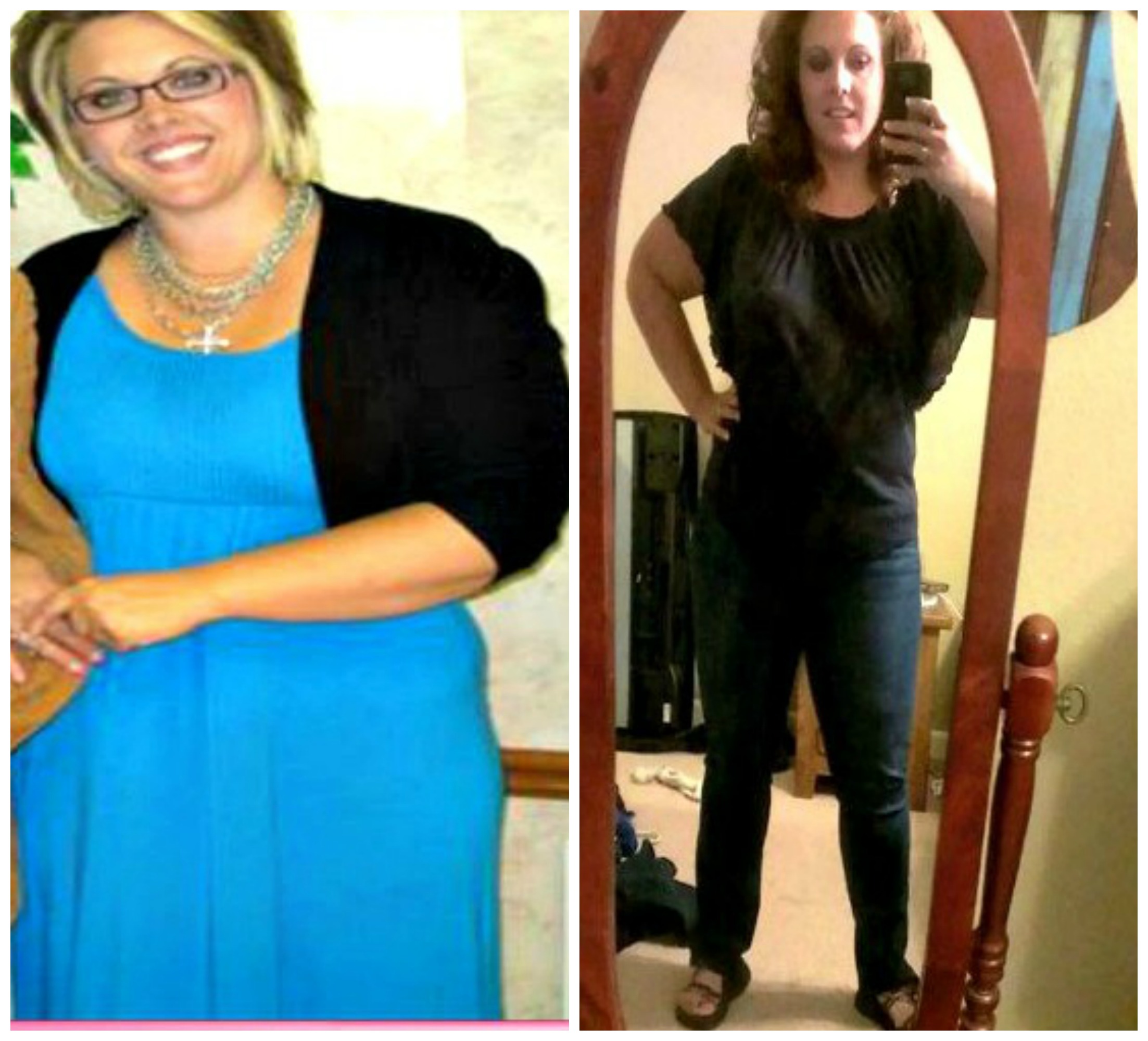
by Trish Adams | May 21, 2015 | Binge Eating, Interviews/Guest Posts, Testimonials, The Journey
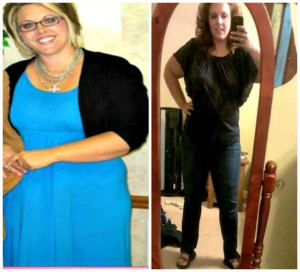 EM2WL: How long have you been on this journey?
EM2WL: How long have you been on this journey?
Mandie: I remember joining weight watchers during the summer between 5th and 6th grade. I always “wanted” to be healthy and fit. I honestly never knew how to accomplish that goal without severe restriction. I have been on this journey my entire life, the struggle has been very real.
How long have I been on the journey of eating more and moving more? I started that journey a few years ago. I was very unsure if it would really work. I approached it like any other diet at first because I honestly didn’t expect much to happen from it. Well, I guess I expected to lose a little weight and then gain a little weight because that seemed to be my life long pattern.
E: When did you first learn that you needed to eat more to reach your goals? What was your original response?
M: A couple of years ago I was going to a local gym where I was being taught to cardio my body into debilitation. I was participating in 30 day smoothie challenges, burpee challenges, plank challenges. I was working my body into injury and pain. The gym, of course, followed this type of pattern in their nutritional advice, (out of their scope of practice) so I was going on very few calories. I lost a little weight, but this formula for destruction wasn’t anything that I could do long term. It was still the restrict-binge cycle that I had always known. I was getting hurt constantly. I knew very little about how this all worked at the time. All I knew was eat as little as possible and move as much as I could. After an injury that put me out of the gym I started researching. I was tired. I was in pain. I was hungry. I wanted something more for my life. I started doing some research on how to rehab my injury. I started looking into how the body worked and studying how this magical thing called weight loss happens.
What I found blew my mind. I discovered this amazing thing called a total daily energy expenditure
(TDEE). This was the amount of calories I burned in a day (I had never really considered how many I burned in a day). I was eating around 1100 calories but was burning around 2500-3000 calories per day. I discovered that if I was in a coma the doctors would feed my around 1600 calories through a feeding tube.
 THIS blew my mind! How could I call myself healthy if I was eating less during my very busy life than a doctor would feed me in a coma. I, like most people, have been lied to by our culture that a woman eating anything over 1500 calories would gain weight at a rapid pace. Women believe this lie because we “think” we see this happening but what we really see is a perpetual cycle of starve-binge. We go on this crazy diets of 1200 calories and lose some weight, but somewhere along the way our bodies kick into survival mode and we start eating. We eat large amounts of calories trying to make up for our starvation time. We end up gaining our weight back and giving up… until we look in the mirror and decide we hate ourselves again and start the cycle all over.
THIS blew my mind! How could I call myself healthy if I was eating less during my very busy life than a doctor would feed me in a coma. I, like most people, have been lied to by our culture that a woman eating anything over 1500 calories would gain weight at a rapid pace. Women believe this lie because we “think” we see this happening but what we really see is a perpetual cycle of starve-binge. We go on this crazy diets of 1200 calories and lose some weight, but somewhere along the way our bodies kick into survival mode and we start eating. We eat large amounts of calories trying to make up for our starvation time. We end up gaining our weight back and giving up… until we look in the mirror and decide we hate ourselves again and start the cycle all over.
I decided to start trying to eat more consistent calories. I started this while trying to rehab a back injury so my start was scary. I gained approx. 13 lbs.. I was not able to do much moving at the time. I look back and giggle because basically I was just “eating more”. I backed off after several months and just ate at my TDEE for a very long time. I have to say though, allowing myself to just eat without the guilt and shame that I usually felt was a welcomed break. Along the way my back finally allowed me to start in on the weights and that is when great things started happening. I finally saw the promised land. I KNEW this was going to work. I KNEW I could do this forever. Eat. Lift. Repeat. YES PLEASE!
Somewhere during the process I also stopped looking at my body as “how small can I get” and I
started thinking “how awesome can I become in my performance”. I can not express how much that small mental switch has altered my life for the better.
E: How did others around you act about your decision to discard the usual low cal methods for weight loss?
M: I am actually laughing as I read this question. Everybody thought I was insane. I was told “you can’t have your cake and eat it too”. To that comment I now say.. “Actually I can”..
E: How did your body react to the initial increase in cals?
M: For women in our society we are taught to be hungry. We are taught it is a virtue to allow yourself starvation. I was no different. I had been on diets my entire life along with binge eating issues. I had been diagnosed in 2005 with anorexia. I had been on the pendulum of torture FOREVER. My body welcomed the break. I found it interesting that all it took was a shift in my mental status for me to be able to eat. I gained the approx. 13 lbs. before I decided to track and eat at my TDEE. My goal was obviously not to gain weight.
E: Did your family notice or comment on any changes once you upped your calories for a period of time?
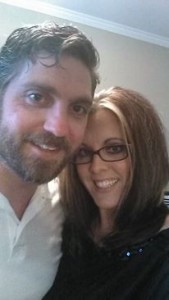 M: My husband was my biggest supporter. I think if my body had never changed he would have still
M: My husband was my biggest supporter. I think if my body had never changed he would have still
kept encouraging this lifestyle for me. Mentally I was at the best place I had ever been. Learning to accept myself enough to allow food in my life, even though I wasn’t at our cultures deemed size. That is a victory for most women. He loved my new found confidence and self worth. There were a few time that I would question myself and he would state very passionately to me “Eat The Food. Lift The Things.” <swoon>
He’s pretty great.
E: Can you describe your typical workout schedule prior to you learning to nourish your body and today?
M: I am laughing again. Oh the torture. I always believed that working out was suppose to be painful. I had that crazy belief that throwing up meant something good. I have done many different workout schedules but they were always inconsistent. I remember several times starting off on my bike for a good ride and having to turn around and come home because I was dizzy. I thought that was normal. I should have just grabbed a snickers.
I also remember the lowest point for me was around the time I was diagnosed with anorexia, I had made a decision to not workout because it caused me to get hungry. This makes me so sad now.
My workout schedule ran with how many calories I was allowing in my body because that determined if I got dizzy or blacked out. I didn’t want to eat enough to get through a full workout.. That would make me fat or fatter, depending on what season of life it was.
 E: As a busy mom of 5, how do you manage to stay on track with your nutrition and fitness? Any tips you can share with our followers?
E: As a busy mom of 5, how do you manage to stay on track with your nutrition and fitness? Any tips you can share with our followers?
M: Put yourself on the list. I wake up in the mornings and mentally go over my day, it is my informal to-do list. I make sure I am on that list. When I go buy groceries I no longer just ask my kids and husband what they would like. I buy the things I love to eat too. I put it in the budget. I am now worth being in our grocery budget. Crazy thing happened when I started buying healthier food. My kids started eating it.
I talk to a lot of moms who don’t have time for fitness or nutrition, or so they say. People think I am
crazy (or horrible) when I ask them “what if your child only did 2 activities instead of 4.” So that they can have a mother who gets to workout and focus a little time on her. There really is only so much time in a day and it is up to us to organize our lives in such a way that we are on the list of things to do for our families.
I do not think mothers see how important their own health is to their family. We are teaching our
children how to eat, how to move and how to treat themselves by our actions. When I realized that… it was huge to me.
E: What is the best way for our the EM2WL fam to get in touch or follow your journey ?
M: I usually hang out in my little community on Facebook called Women Are Hungry. Like most people I love to put my food and sweaty workout pictures up on Instagram so you will find me there as well. I love talking to to women about all things fitness, body image and habit changes so please feel free to hit me up!
I talk to so many women who are afraid to eat. I think when women realize that eating consistent
calories is so much better than the diet cycle:
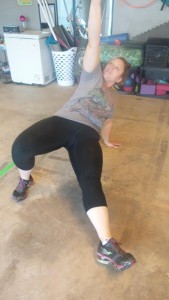 Day 1. fat and I need to lose weight
Day 1. fat and I need to lose weight
Day 2. I will eat only 1100 calories.
Day 3. I am awesome.
Day 4. I am hungry but will make it.
Day 5. I will just eat a little extra today
Day 6. WHERE IS THE FOOD.
Day 7. Eat ALL the food. Screw it.
The thing I find the most insane about this journey is that I haven’t gained any weight in over a year. I have spent my life gaining weight ( and losing and gaining and losing). I feel in control. I spent many years thinking weight loss was magic. It isn’t magic it’s science. I still have fat to shed and muscle to gain, but the great part about that is I know how to do it. I am no longer
on a time frame with my fitness and nutrition. It is just what I do. I no longer have an end
date. I don’t have a perfect body. I don’t have 12% body fat, however my imperfect body is
exactly where I want it to be right now.
Slow and steady is where long term success happens.
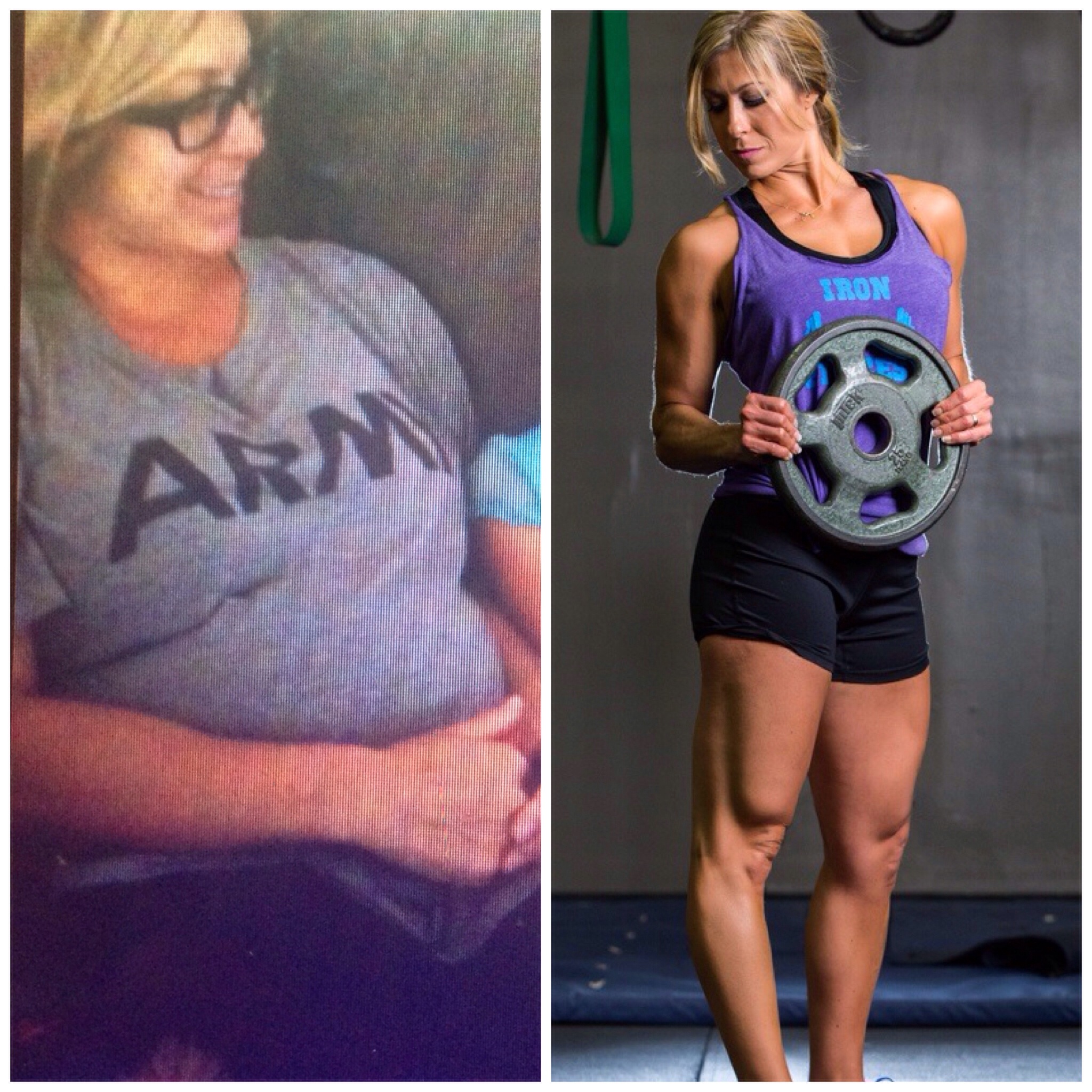
by EM2WL | Mar 10, 2015 | Current Fitness Competitors, Fat Loss / Cutting, Interviews/Guest Posts, Self Acceptance, Strength Training
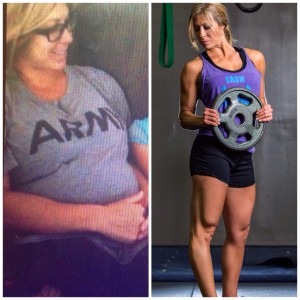 EM2WL: Like so many of us, you bought into the eat less move more propaganda. You talked about being at your ideal scale weight but your body still not looking the way that you wanted. What was the turning point for you and what steps did you take to make a change?
EM2WL: Like so many of us, you bought into the eat less move more propaganda. You talked about being at your ideal scale weight but your body still not looking the way that you wanted. What was the turning point for you and what steps did you take to make a change?
Christie: It’s true, I ran more and ate less thinking being smaller (on the scale) would get me closer to my ideal “look.” My moment of change came when a trainer at my gym noticed my athletic drive, asked if I’d consider a figure competition (had no clue what it was, did my research and saw the look I wanted). I dived in and quickly learned I needed to eat more, run less, and train smarter to change my body. I stopped cardio almost completely, lifted 4-5 days a week hitting each body part, and made sure I was eating enough to support my goals.
E: You used to be a runner, right? Where do runs fit in your regimen now?
C: I do love what a run can do for the spirit, and will do so when I feel the need, but I do s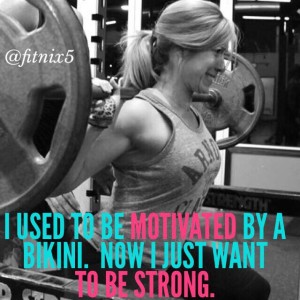 prints mostly now, for 10-12 minutes, and that’s the extent of my running. 30 seconds on and 30 seconds off.
prints mostly now, for 10-12 minutes, and that’s the extent of my running. 30 seconds on and 30 seconds off.
Here is a blog I wrote specifically to running vs. lifting and my body/mindset.
http://www.fitnixfitness.com/2014/09/09/running-vs-lifting/
E: What advice do you have for women who are pregnant and worried about ‘ruining’ their body, or postpartum and scared that they’ll never get their pre-baby body back?
C: You aren’t ruined, changed, yes, ruined, no!! I love that I can share my postpartum journey, pregnancy takes over my body, regardless of my efforts, I gain a lot, and lose all muscle tone…basically, if I chose to accept the mentality that I was ruined, I most certainly would look that way. My advice, know what you want, do your part each day, give yourself the GRACE you would a friend to get there, and your body will take form like you never thought possible. You’re a mom now also, training is about more than a look at this point, it’s a break, a spiritual release, and being strong means more than a look…you’ll find the journey to inner strength will take you farther than any “body after baby” goal ever will.
 E: Switching gears to your figure competition diet and prep…People often hear of a competitor doing a 9,12, 20 week, etc competition prep and feel that their own journey should be “finished” within similar lengths of time. How long would you say the time was between giving birth and the “official” beginning of prep for your recent return to the stage? (In other words, how much “pre-prep” prep?)
E: Switching gears to your figure competition diet and prep…People often hear of a competitor doing a 9,12, 20 week, etc competition prep and feel that their own journey should be “finished” within similar lengths of time. How long would you say the time was between giving birth and the “official” beginning of prep for your recent return to the stage? (In other words, how much “pre-prep” prep?)
C: Great question!! I knew I wanted to compete at least once more after baby #3 so I trained with that in mind. I just recently picked a show in April and started my actual prep in January, knowing I did my part the past year to facilitate a healthy and balanced approach to the stage. So 17 months or so of training and proper nutrition, and 4 months of actual prep.
E: There seems to be a divided camp these days. Do you feel that it’s possible for women to practice both body acceptance AND seek improvements at the same time?
C: I couldn’t agree more. Sometimes I wonder where I fit…and my answer is YES!!!
My self-love, acceptance, and perspective doesn’t come from how I look, it comes from God!! But God also put a fire in me to do more, be more, strive for more…for now that takes on the form of competing in the sport of Figure. While it is extremely subjective, I know that I am giving it my all and will hit the stage with that attitude. The idea of seeing what I’ve worked for on stage, taking time to assess my progress and continue to strive for more excites and pushed me!
However, competition or not, the gym is where I look to be judged, am I getting stronger, am I doing a little of what scares me, am I lifting more and moving better…being fit and striving for more has so much more to do with how you feel than how you look!!!
E: Has any of your body composition changes affected the way that you dress, clothing size/style?
 C: Actually…no…I weigh the most I ever have and wear the same size pants. I naturally have a wide frame around my lats, so now I’ve embraced that and know to grab a medium top first and go from there. Doesn’t mean I’m fat, need to lose weight, or should restrict things from my diet, just means I’m better at those pull-ups I’m always trying to perfect.
C: Actually…no…I weigh the most I ever have and wear the same size pants. I naturally have a wide frame around my lats, so now I’ve embraced that and know to grab a medium top first and go from there. Doesn’t mean I’m fat, need to lose weight, or should restrict things from my diet, just means I’m better at those pull-ups I’m always trying to perfect.
E: Moms often feel the pull between fitness, career goals, and spending enough time with their family. With 3 kids of your own, a personal training/nutrition coaching business and preparing for return to the stage, how do you keep everything in balance?
C: The best part of being a fit mom, is working with other fit moms…they understand. So I have set hours for work and the rest is family time. I look at my mom duties, schedule, errand routine, and plan my fitness business around that. As for my training, its an appointment with myself also. I block off time to do that as well.
As for competition prep on top of all that…I took the past 15 months as a part-time working mom of three to fine tune the habits I’d need to do a Figure show, learning how to balance the family, training, work and meal planning. And I have to admit I’m a big fan of a meal replacement shake for on the go!!
E: Where would you suggest a new mom start with getting back in shape?
C: I love this quote, “start where you are, use what you have.” And that’s the secret, you just have to start. If you love to run, make a plan and go run, if you want to lift weights, hire a trainer and learn your way around the gym, join a cross fit box, there are so many people out there waiting to help you, invest into yourself and go for it!! Start small and build from there!!
E: How can our readers hear more from you?
C: Would love the company of any of your followers on my social media sites,
Website: fitnixfitness.com
Facebook: facebook.com/fitnix5
Pinterest: pinterest.com/fitnix5
Instagram: instagram.com/fitnix5
Twitter: twitter.com/fitnix5
Youtube: Christie Nix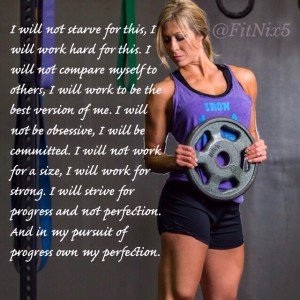

by EM2WL | Jul 29, 2014 | Binge Eating, Interviews/Guest Posts, Intuitive Eating, Nutrition
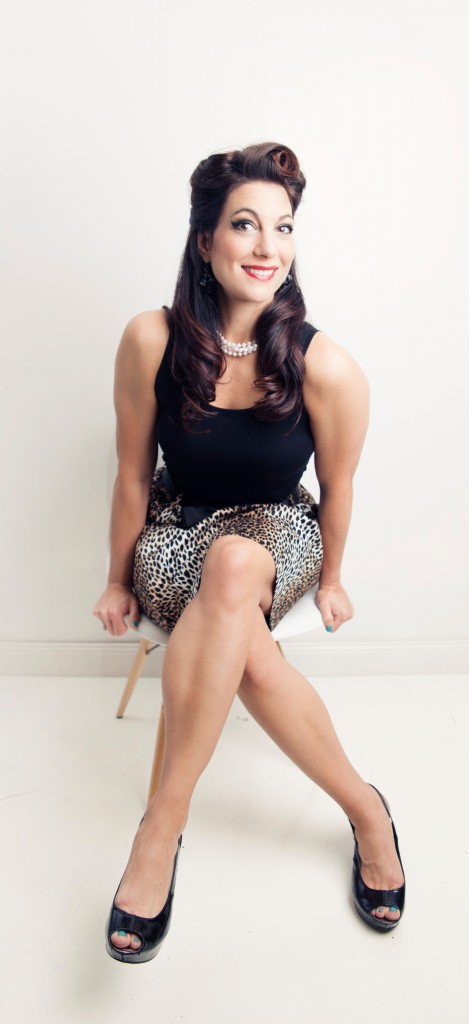
I recently heard dietician/nutritionist, Leslie Schilling, speak at the NSCA National Conference. She instantly wooed me with her Southern drawl, love of food, and “anti-diet” approach (a dietician against diets?! What’s not to love?). Of course, I commenced to immediate stalking, and cornered her for an interview ;) ~Kiki
EM2WL: Your session at the conference “When Diets Don’t Work” focused on Binge Eating Disorder (BED). Can you explain to our readers what BED is?
Leslie: A diet, whether it is the first or fiftieth, could be the trigger to a life-altering or even life-threatening eating disorder. According to the National Eating Disorders Association, these illnesses can affect people of any race, age, sex, or size. Last year, the most common yet under recognized disorder received an official diagnosis code. Now those suffering with BED can no longer be overlooked. BED is associated with the following signs: recurrent binging (once a week for more than 3 months), eating larger than normal amounts of food in a short period of time, and lack of control during the binge episode. According to the Binge Eating Disorder Association, BED may affect 3.5% of women, 2% of men, and as many as 40% of all those seeking weight loss treatments.
EM2WL: Other than lack of purging/excessive exercise, what separates BED from Bulimia and Anorexia?
Leslie: There is no compensatory behavior like over exercising, restricting or “getting rid” of food (purging in any way).
EM2WL: I wonder if it is possible to have this disorder and not know it. A lot of people refer to “cheat meals,” justifying overeating on the weekends after “being good” all week. Does this type of diet mentality have any bearings on developing BED?
Leslie: Yes, it is possible to have BED and not realize it. Dieting over the years, as well as a common culture of “diet-mentality,” may mask an underlying problem. Many of us overeat from time to time, and even eat when we are not hungry. Those with binge eating disorder, however, eat for reasons not always associated with hunger. For example, people suffering from BED may use food to reward themselves, or to escape emotions associated with grief or anxiety, stressful situations, anger, hurtful memories or even past traumas.
My philosophy about “cheat meals” is simple. If what you’re doing requires that you “cheat,” I don’t believe it’s a sustainable or healthy. You could absolutely be eating better than you once did, but perspective matters. I believe in an 80/20 approach which I define as eating whole and low-ingredient foods most of the time and comfortably blending it with pleasurable foods that may or may not have a high nutritional value. Like, I have this thing with cupcakes…
My philosophy about “cheat meals” is simple. If what you’re doing requires that you “cheat,” I don’t believe it’s a sustainable or healthy.
EM2WL: Would you consider an overindulgence, say eating an 2 or 3 servings of a favorite dessert, a binge? How can we distinguish between an overindulgence v a binge?
Leslie: It’s possible I could eat two cupcakes here and there. I likely over-indulged and won’t do that again for a long time. A binge may look like 4, 6, or even a dozen cupcakes but it really depends on the person and the motivation.
Here’s an example—If I eat an extra cupcake because Aunt Betty makes amazing strawberry cupcakes, it may be a simple indulgence. If I’m eating 2, 4, etc.. of Aunt Betty’s cupcakes because my boss said something horrible to me—I’m “using” food and therefore, potentially binging.
EM2WL: The term ’emotional eating’ is used quite a bit with regard to challenges faced when trying to lose weight. Is this just another label for BED?
Leslie: Normal eaters sometimes eat for emotional reasons vs. physiological hunger. However, when you find yourself eating for reasons other than hunger frequently, it’s possible there could be some form of disordered eating going on, like BED.
If someone is over “using” food, it’s possible to teach them the tools to recognize and redirect those behaviors. Once they improve those behaviors, it’s very likely that weight loss becomes a side-effect.
EM2WL: You mentioned that if the shame-based approach worked, that the problem might not be as widespread. How does the media, trainers, friends, or parents contribute to the shame-based approach to fat loss? And how does that play into BED?
Leslie: Many of us who work in the field of disordered eating say “if shame worked, no one would have a weight issue.” Making someone feel bad about themselves is NEVER productive. Our “war” on obesity has become a war against people, real people, like you and me, with real life problems. I like to think you catch more flies with honey. Being caring and non-judgmental opens the door to sustainable change. Here’s one of my favorite quotes.
Nobody really gets anywhere “shouldn’t’” on themselves. When we feel the pressure to change things like our bodies, our diets or exercise routine, it’s important that trainers, dietitians, parents, health professionals, etc… use an approach that moves someone towards making healthy decisions for themselves. I rarely support someone’s goal of “weight loss.” I discuss what’s going on with their food, lack of food, over “use” of food, and help them set goals that promote lasting healthy behaviors. If someone is over “using” food, it’s possible to teach them the tools to recognize and redirect those behaviors. Once they improve those behaviors, it’s very likely that weight loss becomes a side-effect.
EM2WL: If someone suspects they might have BED is there anything they can do on their own to treat the disorder?
Leslie: It’s unlikely, yet not impossible. It’s about the food and NOT about the food at the same time. A successful team usually includes an experienced mental health professional along with an experienced dietitian (one who works with BED/emotional eating).
If you’re wondering if you may need a little help, you can absolutely start by helping yourself. Keeping a food journal (no calories, numbers, etc) to record when you eat, what you eat and how you’re feeling (am I hungry, angry, lonely, tired?). An individual non-judgmental investigation of how you’re using food can provide tremendous insight.
EM2WL: As a dietitian, what do you feel the biggest flaw is in the “eat less, workout more” philosophy?
Leslie: If it were as simple as eat less, work out more, I think most every person on the planet would have mastered the food and weight thing by now. We often assume it’s all about energy in and energy out. It’s not really when you think about all the other factors that influence our body weight & eating—emotions, endocrine issues, body types, dieting history, fitness levels, and so on…
I love giving this example. Say you have a 50 calorie snack and a 150 calorie snack. If you’re simply eating based on a quantity (calorie) approach, it’s very possible you’ll pick the fat-free, sugar-free chemical soufflé. If you eat based on a quality approach, you’re more likely to pick the higher energy choice—almonds—ingredient: almonds.

EM2WL: You have a new dinner menu service launching soon, deets please!! What awesomeness should we expect from Your Supper Solution?
Leslie: I’m incredibly excited about this launch! Earlier this year I’d enrolled in a business development course because I needed direction for my next steps as an entrepreneur. As you know, I’m a registered dietitian/nutritionist but I was stuck. This desire to do something that could positively impact people on a larger scale was really eating at me. I didn’t know if I needed to focus on expanding my private practice, speaking engagements, write a book, or what. The lack of clarity was incredibly frustrating.
As I was doing my homework (which I loved because I’m a total geek), it came to me. I rock planning a menu like nobody’s business and I realized that planning has been a major part of what I’ve been helping people with for the last 10 years.
Many people can cook, follow a recipe and shop but most HATE the planning. So, I’ve created Your Supper Solution—an online monthly membership service that delivers weekly dinner menus. It’s a balanced, back-to-basics, real food approach to getting supper solved! Menus roll out August 1st! Here’s a quick video about it.
EM2WL: Sweet! You know I’m already on the pre-launch list, lol. Where else can our readers read/see/hear more from you?
Instagram: http://instagram.com/leslieschilling
Facebook: https://www.facebook.com/NutritionLeslie
Twitter: https://twitter.com/NutritionLeslie
Pinterest: http://www.pinterest.com/leslieschilling/
Meal Planning Website: www.yoursuppersolution.com
Memphis-based Private Practice Website: www.schillingnutrition.com

Leslie Schilling
Leslie is a master’s level, registered, and licensed dietitian/nutritionist who specializes in wellness, disordered eating, sports nutrition, and the prevention of chronic dieting. She received her Bachelor of Science and Master’s degrees from Appalachian State University in NC. Leslie owns Schilling Nutrition Therapy, LLC, a Memphis-based nutrition counseling practice, and is the creator of Your Supper Solution.
She is a member of Sport, Cardiovascular and Wellness Nutrition (SCAN), Behavioral Health Nutrition (BHN), Nutrition Entrepreneurs (NE) Practice Groups of the Academy of Nutrition and Dietetics (AND), the National Strength & Conditioning Association (NSCA), the Eating Disorders Coalition of Tennessee (EDCT), and The National Speakers Association (NSA).
Leslie has served as an adjunct instructor in the Graduate Nutrition Program at the University of Memphis. She has also been invited to provide her humorous, down-to-Earth nutrition programs and presentations to groups and professionals across the nation. In addition, she writes for local media, professional, and consumer publications. Whether it is through appearing on a television show, speaking to a crowd, or writing, Leslie inspires those she encounters to get back-to-the-basics with food and make self-care a priority through planning.

by Trish Adams | May 13, 2014 | Building Muscle, Fat Loss / Cutting, Increasing calories, Interviews/Guest Posts
Team EM2WL would like to extend a warm welcome to our newest guest blogger, Jared Harris, a recent college graduate with a passion for writing and fitness! Today, Jared shares a series of tips on how to get motivated when winter is over!
We all know how important it is to exercise and eat right. We also all know how easy it is to slip into a winter season of laziness and comfort food-holiday weight gain and the convenience of a big black pea coat. But as summer makes its way ever so slowly to our hemisphere, we have to start facing the music. And it’s not easy. I know I am far more hesitant about throwing on a pair of running shorts and hitting the gym when I’m feeling those extra few pounds. I know after a long day at work, sometimes all I want to do is grab a bag of popcorn and sit in front of the television.
So, we additionally know what we’re up against and what we should do about it. Exercising and eating right are great, but it’s really in how we do those things 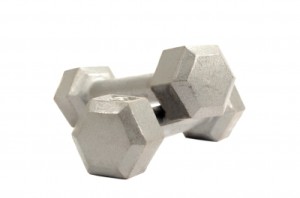 that counts. Eating right does not by any means translate to skipping meals, starving yourself, or only eating foods that you don’t like. And exercising does not necessarily translate to running miles upon dull miles on the treadmill. It’s all about balance and achieving the right body composition for you. According to a study done by IDEA Health & Fitness Association, as reported by Examiner, “weight training is indeed fat burning exercise.”
that counts. Eating right does not by any means translate to skipping meals, starving yourself, or only eating foods that you don’t like. And exercising does not necessarily translate to running miles upon dull miles on the treadmill. It’s all about balance and achieving the right body composition for you. According to a study done by IDEA Health & Fitness Association, as reported by Examiner, “weight training is indeed fat burning exercise.”
Finding the time to exercise, as well as keeping up with nutrition is a lot. But for many people, negative body image and failure to accept themselves are really what’s keeping them from the healthy lifestyle they want and know they need. As one physician wrote on Sharecare, “The key to having a healthy lifestyle and sticking with it is you. If you are down on yourself, the less likely you are to succeed and the more likely you are to give up… Staying positive and focusing on all that you have accomplished will help you win the weight loss, exercise for life change game with joy.”
So here are some ways to integrate your workouts; to make sure you are taking care of your BMI, your heart, your muscles and joints, your mind, your moods, and your self-esteem.
Consider Weight Lifting
It’s not just for men who want to bulk up. In fact, muscle strengthening workouts are crucial for healthy body composition and weight loss, which many people don’t realize. Experience Life featured an article about one woman’s quest to lose weight after having children; the key to her success turned out to be “shorter, more intense workouts with weights that were never the same from one day to the next,” rather than what she’d been trying before, which was essentially just running off the extra weight. Often, we can get bogged down in hours of aerobic exercise when really, the combination of strength training and aerobic exercise together is the key. Health magazine recommends doing “all-over strength workouts 2-3 times per week leaving at least a day’s rest in between.” If that is not working out your whole self, I don’t know what is.
Take Control of Your Health
With ever-improving technologies to help track health and fitness, it’s becoming easier to have one go-to gadget to consult with about what’s next on your exercise or diet plan. For example, Verizon Wireless writes that an upcoming phone, the Samsung Galaxy S5, will arrive with the S Health program to “track your steps, challenge friends, earn badges and get on–demand healthy eating advice.” Interesting, though even more so is the built–in heart monitor that’s apparently a first in the mobile phone world. In other words, it looks like an all-in-one way to keep track of your plan—and stick with it.
Feed Yourself
Many people think staying healthy is all about painful, joyless exercise and restriction in food intake. That’s all wrong. We stick with exercise plans when we enjoy them and we are our healthiest when we’re eating a variety of lots of different foods. Not getting enough calories limits nutrition and makes the body slow its metabolism. Instead, as Cameron Diaz points out in her new book, reviewed by the New York Daily News, there is a rationale behind embracing the “the instinct of hunger” by satisfying it “with whole, nutrient-dense foods.”
No matter what your goals are, health is always about a balance of mind and body. Be sure you keep your goals in mind (or in hand), take in enough nutritional foods to keep your immune system healthy and your metabolism going strong, and always accept and love yourself wherever you are each day.
Photo credits: Gualberto107, stockimages
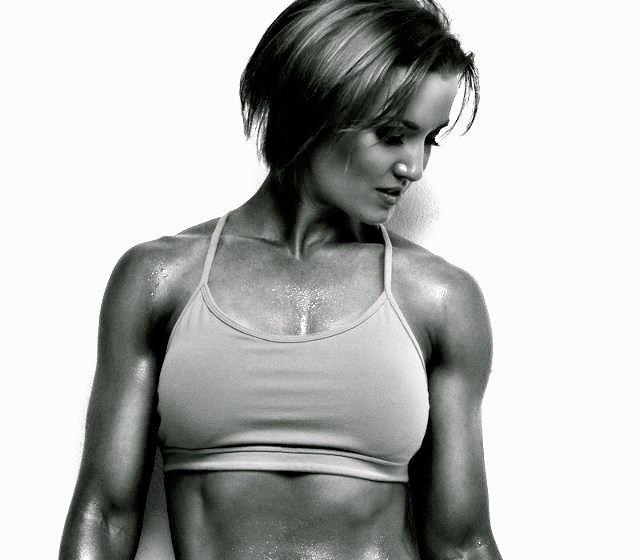
by Trish Adams | May 7, 2014 | Former Fitness Competitors, Interviews/Guest Posts, Intuitive Eating, Nutrition, Self Acceptance
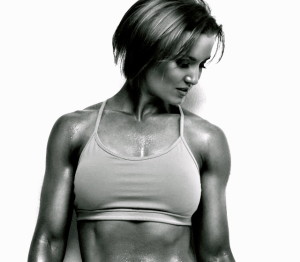
Dani Shugart
After following Dani for some time, I was so excited to finally have an opportunity to get into her head a bit deeper. This figure competitor knows firsthand the dangers of disordered eating and helps her clients break the cycle and rebuild their relationship with food.
EM2WL: Thanks again, Dani, for agreeing to be interviewed. Just to give everyone a brief background, you started lifting in high school which led to competing and winning several competitions, most recently taking first place in novice and third place in open at this year’s Axis Labs Northern Colorado’s figure competition. You’ve also authored several articles and recently published The Sound of Secrets: End Disordered Eating, recounting your sister’s battle with the disease. Why did you feel the need to write this book?
Dani: I wrote this book after losing my big sister. She struggled with anorexia for nearly two decades, and a few months after her death it occurred to me that my sister’s struggle, though extreme, started somewhere fairly benign, at a place where a lot of women find themselves now.
I wrote the book to stop women (and men) from going down that same route, and to help them break out of the eating habits that make them feel and look miserable.
 E: In your book you labeled disordered eating as the new normal. How do you think society has come to this state?
E: In your book you labeled disordered eating as the new normal. How do you think society has come to this state?
D: I don’t know if we can blame any one thing. It would be easy to point the finger at Photoshop, the media, and the underrepresentation of strong, healthy bodies. But I think it’s more complicated than that.
I have to wonder if the rise in disordered eating is just a backlash (a strong and adverse reaction) to the rise in obesity. Maybe people are just trying to avoid becoming the norm but going about it in counterproductive ways. There’s a general misunderstanding about how to be lean and healthy for the long haul.
Another thing that might have something to do with it is the increasing availability and consumption of hyperpalatable, processed foods. The salt/sugar/fat trifecta makes a lot of people compulsive overeaters. (It had that effect on me.) And when people want to be thin, yet become addicted to foods that do the opposite, they resort to compensatory actions instead of building a healthier relationship with foods that nourish.
Any level of disordered eating is a thief of our happiness, sanity, health, time, self respect, and potential.
E: Do you feel that many of today’s popular diets like paleo or IF contribute to the problem? What are your thoughts on IIFYM?
D: I think modern diets are just a symptom of a problem that’s already there. Sure, they can contribute to it and overcomplicate it, but diets are not where the problem begins. The problem begins in the mind, and it begins with our perception of what will make us healthy, fit, lean, and happy long term. Those who are obsessed with weighing less at the expense of their health are at risk for disordered eating, no matter what diet they subscribe to.
IIFYM (like many dieting strategies) can be beneficial or harmful depending on what your mindset is when using it. If you’re really focused on nourishing yourself then it can be used for good. It has its place, but it’s not a way of life. Counting and measuring everything you eat for your lifetime is insanity. Are you going to take scales and measuring cups with you everywhere you go? At some point you have to trust your ability to eye-ball an appropriate amount of food, and then eat according to your hunger. At some point you have to trust that your metabolism will work in your favor and use everything you consume.
Another thing — avoiding hyper-palatable food, the stuff that’s engineered to make you eat more, is a good idea. But I don’t see that as dieting, just self-defense. And filling your body up with what you know will nourish and satiate, is the best way to take care of yourself and become leaner in the process. No diet necessary.

E: When most people think of disordered eating, images of purging or extreme restrictive dieting come to mind. Would you consider behavior where someone regularly over indulges on the weekend and then tries to ‘burn it off’ or restrict calories afterward to be disordered eating?
D: Yes, this is definitely disordered. Anytime you overindulge and then try to compensate for it, you’re engaging in what I described in the book as the “binge-punish” cycle.
When working with clients, I also refer to it as the Good Girl/ Bad Girl cycle or Good Boy/Bad Boy cycle. People perceive their behavior as “bad” when they lose control, and then they perceive their behavior as “good” the next day when they try to undo the damage. A lot of folks go through this cycle every single day and don’t realize it’s disordered… all they see is the weight gain that happens as a result. So when I work with clients who are want to lose weight we have to address this cycle first.
E: In your book you describe the 5 phases of the binge-punish cycle which start with highly addictive engineered foods and ends with bingeing. What are some ways people can break this cycle?
D: There are so many ways to break the cycle and they all depend on the person. But here are three that I often use with clients:
Breaking the cycle begins when you have the most control. If you end the day famished and tired, you’ll be more likely to default to whatever behavior is easiest or most habitual. This often means choosing the most convenient food – whatever it may be. So if you’re used to eating food that makes you crave more, you’re going to grab that in a moment of weakness. To break the cycle, nourish yourself early and often, and you’ll prevent the need to reach for things that don’t serve you.
 Another way to break the cycle is just to make sure that your (home and work) environment accommodates it. Make sure you have healthy go-to foods available everywhere you are so that even if you are tempted to seek foods that trigger more eating, you have another easily available option.
Another way to break the cycle is just to make sure that your (home and work) environment accommodates it. Make sure you have healthy go-to foods available everywhere you are so that even if you are tempted to seek foods that trigger more eating, you have another easily available option.
Another way to break the cycle is to find out why you’re eating. Is your reason for eating physical or psychological? Check in with yourself and ask, “Am I eating this because I’m really hungry, or am I looking for a distraction and mental relief?” Strong emotions can start the cycle, and if you can get down to the bottom of WHY you’re reaching for food in the first place, then you can begin to establish strategies to deal with these emotions aside from food.
E: How important is it to have self compassion when trying to break free from disordered eating?
D: Self compassion doesn’t come naturally for most of us because we operate under the assumption that if you’re hard on yourself you’ll be more successful. This is a giant misconception and I think it’s what keeps people locked in their disordered eating.
Fighting against yourself instead of fighting on the same team makes it much harder to reach your goals. Once people really grasp this, they’re able to help themselves and break free. Self compassion is getting on your own team, and I think it’s essential for success.
For those that are suffering from disordered eating what are some steps they can take toward rebuilding their mindset about food?
Seek understanding. Find resources (books, coaches, articles, other people) that can help you change your mindset. Focus on changing your thinking and behavior instead of your macros and calories.
Women tend to get excited by weight loss no matter how it’s accomplished.
E: Fitness and strength training have obviously been a big part of your life. At EM2WL we encourage women to lift heavy weights and often run into the ‘fear of getting bulky’ objection. What do you say to women when faced with a similar concern?
 D: This is one of my favorite things to address. If you’re trying to change your disordered eating you have to change your disordered thinking. See if you can let go of the smallness goal because ironically, the strategies that make you weigh less initially are the same exact ones that either backfire and make you gain weight in the long run, or enslave you in a life of wasting away.
D: This is one of my favorite things to address. If you’re trying to change your disordered eating you have to change your disordered thinking. See if you can let go of the smallness goal because ironically, the strategies that make you weigh less initially are the same exact ones that either backfire and make you gain weight in the long run, or enslave you in a life of wasting away.
When you lose weight without building muscle you become a “smaller” person. And as such, you have to eat fewer and fewer calories (otherwise you’ll go right back to the same weight you were). But muscle changes that. It makes you expend more energy, and it requires you to consume more energy to grow.
Muscle not only ups your metabolism it also makes you look leaner. No matter how much weight you’re carrying, muscle will change the shape of your body like nothing else. And in order to have muscle definition, you have to have muscle. There’s no way around it.
E: Thanks again Dani! How can our readers hear more from/follow you?
D: Thanks for letting me share! Get in touch! Here’s where you can find me:
Website: http://www.goodgirlfitness.net
Facebook: https://www.facebook.com/GoodGirlFitness?ref=hl
Twitter: https://twitter.com/DaniShugart
Instagram: http://instagram.com/danishugart
Photos credit: www.bigstock.com

by Trish Adams | Feb 28, 2014 | Cardio, Former Fitness Competitors, Interviews/Guest Posts, Testimonials
After working with a personal trainer for 2 years and competing in her first competition, Stephanie realized that under-eating and doing excessive cardio may not have been the best advice. Now she has put competing on hold to focus on building healthy habits. 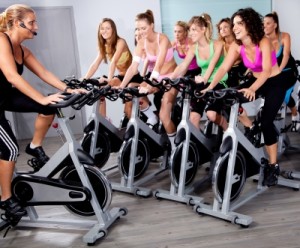 Five years ago I was going through many things in my life that most of my closest friends and family weren’t even aware of. I was depressed and had blown up to 220 pounds. I hated exercise and loved food (still love food). I was embarrassed to even leave my house in fear I would run into someone I knew. A friend asked me to start walking with her. “Ugh!! Really??”..was likely my response. She continued to nag me until I finally gave in. We started walking the track a few times a week. Just a mile. Felt pretty good though. I decided that I hated the way I looked and felt and I was the only person that could fix it. So I started watching my portions and started exercising at home for 20 minutes 6 times a week. Then my friend asked me to do a bootcamp with her. “Ugh!!!!” Yep, again. After assuring me it was suitable for all fitness levels (it wasn’t….at all) I again gave in and went. Longest, hardest and most miserable 60 minutes of my life. But I did it and continued to do it for several weeks a few nights a week until the camp was over. After losing 30 pounds on my own, I was introduced to a personal trainer. I asked his price and hired him on the spot. This was a huge turning point. I trained 3 times a week and took spin 3 times a week. My trainer mentioned the possibility of me competing in fitness competitions. It sounded very intriguing and what a goal!!!! I trained with my trainer 3 times a week for 2 years. In that time I did compete in my first fitness competition. It was probably the most rewarding thing I’ve ever done…and the most physically, mentally and emotionally wrecking.
Five years ago I was going through many things in my life that most of my closest friends and family weren’t even aware of. I was depressed and had blown up to 220 pounds. I hated exercise and loved food (still love food). I was embarrassed to even leave my house in fear I would run into someone I knew. A friend asked me to start walking with her. “Ugh!! Really??”..was likely my response. She continued to nag me until I finally gave in. We started walking the track a few times a week. Just a mile. Felt pretty good though. I decided that I hated the way I looked and felt and I was the only person that could fix it. So I started watching my portions and started exercising at home for 20 minutes 6 times a week. Then my friend asked me to do a bootcamp with her. “Ugh!!!!” Yep, again. After assuring me it was suitable for all fitness levels (it wasn’t….at all) I again gave in and went. Longest, hardest and most miserable 60 minutes of my life. But I did it and continued to do it for several weeks a few nights a week until the camp was over. After losing 30 pounds on my own, I was introduced to a personal trainer. I asked his price and hired him on the spot. This was a huge turning point. I trained 3 times a week and took spin 3 times a week. My trainer mentioned the possibility of me competing in fitness competitions. It sounded very intriguing and what a goal!!!! I trained with my trainer 3 times a week for 2 years. In that time I did compete in my first fitness competition. It was probably the most rewarding thing I’ve ever done…and the most physically, mentally and emotionally wrecking.
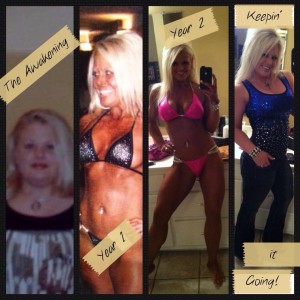
Stephanie’s Transformation
After two years I felt I was outgrowing my trainer and wanted to go in a different direction. I felt the next natural step for me was to become certified to train (I was already a certified spin instructor by this time). I became certified and continued to compete…learning from my mistakes and really bad advice all along the way. Under-eating and over-doing cardio. This year I really changed my approach and decided to skip competing this season. I was developing healthier habits and was afraid my habits were so new that if I competed I would resort back to old ways. Will I compete again? Yes. Hopefully with a much more wise approach. Until then I will continue to search for my happy place while motivating and training others while helping them avoid the pitfalls I suffered. Exercise is the easy part…food…that’s tough. I have to remember to give myself credit (and a break) for how far I have come…even though I still have so far to go to become balanced.
Has eating more changed your life? Have an EM2WL transformation to share? We’d love to see it! Be featured on our Transformation/Journey page by submitting your story to Success@EM2WL.com
Spin photo credit: Photostock

 EM2WL: How long have you been on this journey?
EM2WL: How long have you been on this journey? THIS blew my mind! How could I call myself healthy if I was eating less during my very busy life than a doctor would feed me in a coma. I, like most people, have been lied to by our culture that a woman eating anything over 1500 calories would gain weight at a rapid pace. Women believe this lie because we “think” we see this happening but what we really see is a perpetual cycle of starve-binge. We go on this crazy diets of 1200 calories and lose some weight, but somewhere along the way our bodies kick into survival mode and we start eating. We eat large amounts of calories trying to make up for our starvation time. We end up gaining our weight back and giving up… until we look in the mirror and decide we hate ourselves again and start the cycle all over.
THIS blew my mind! How could I call myself healthy if I was eating less during my very busy life than a doctor would feed me in a coma. I, like most people, have been lied to by our culture that a woman eating anything over 1500 calories would gain weight at a rapid pace. Women believe this lie because we “think” we see this happening but what we really see is a perpetual cycle of starve-binge. We go on this crazy diets of 1200 calories and lose some weight, but somewhere along the way our bodies kick into survival mode and we start eating. We eat large amounts of calories trying to make up for our starvation time. We end up gaining our weight back and giving up… until we look in the mirror and decide we hate ourselves again and start the cycle all over. M: My husband was my biggest supporter. I think if my body had never changed he would have still
M: My husband was my biggest supporter. I think if my body had never changed he would have still E: As a busy mom of 5, how do you manage to stay on track with your nutrition and fitness? Any tips you can share with our followers?
E: As a busy mom of 5, how do you manage to stay on track with your nutrition and fitness? Any tips you can share with our followers? Day 1. fat and I need to lose weight
Day 1. fat and I need to lose weight
























Recent Comments